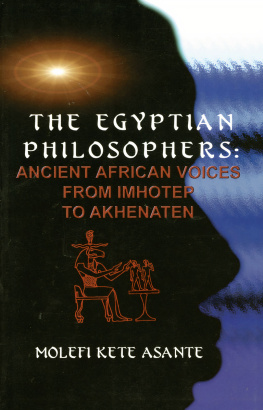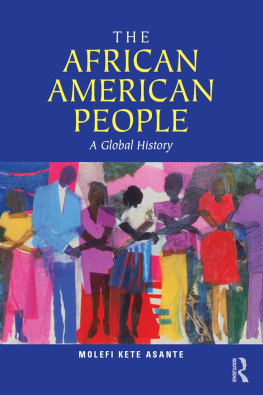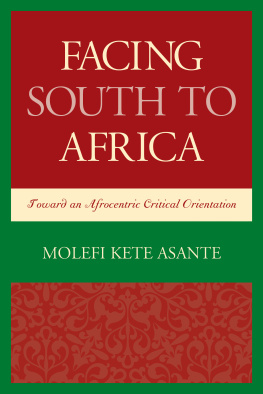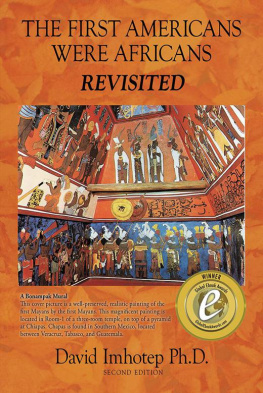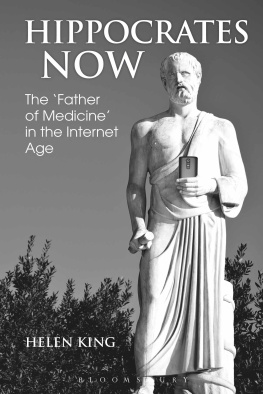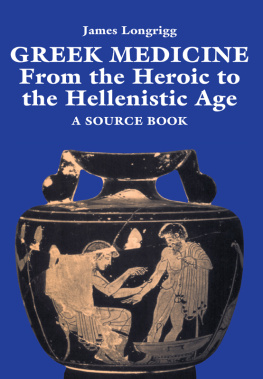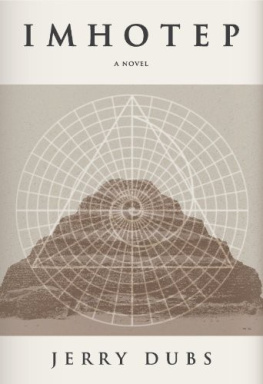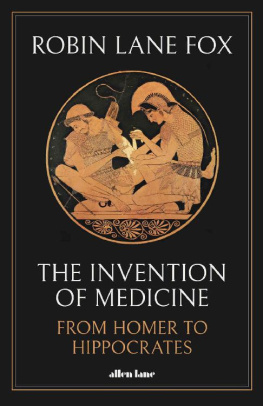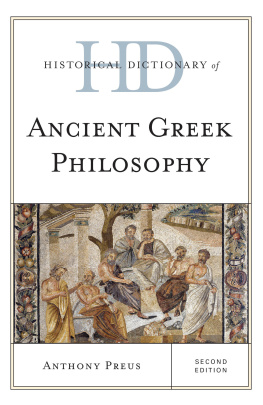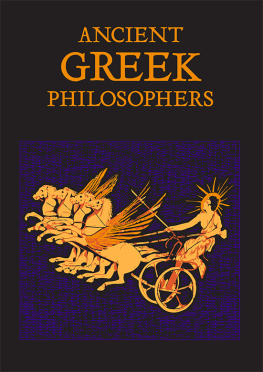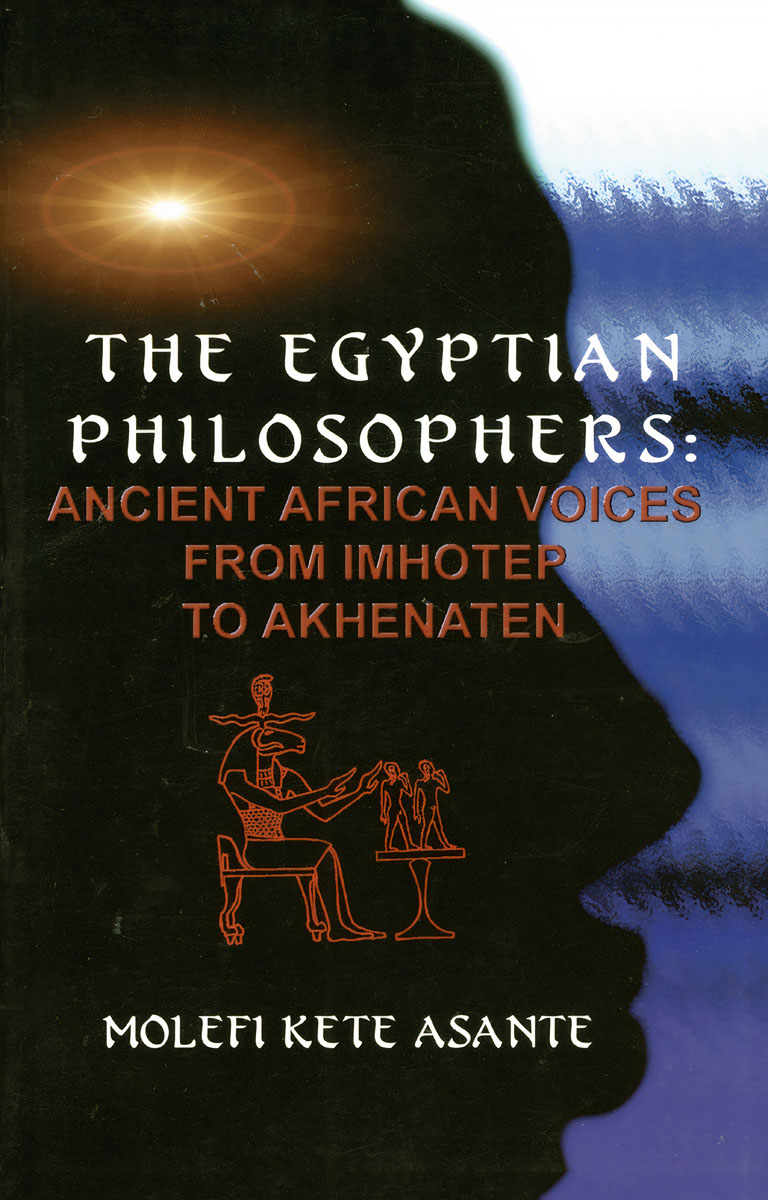
Front cover illustration by Tony Quaid
Text illustrations by Aaron Wilson
Copyright 2000 by Molefi Asante
First Edition, First Printing
All rights reserved. No part of this book may be reproduced, stored in retrieval systems or transmitted in any form, by any means, including mechanical, electronic, photocopying, recording or otherwise, without prior permission of the publisher.
Printed in the United States of America
ISBN: 0-913543-66-7
Typeset and designed by Sussex Academic Press, Brighton & Eastbourne.
Printed by Edwards Brothers Malloy, Ann Arbor, USA.
This book is printed on acid-free paper.
CONTENTS
PREFACE
I have written this book for those who are interested in discovering the knowledge of the ancient ways. One does not have to possess knowledge of the Egyptian language to read this book and to benefit from the extensive wisdom of an ancient people whose civilization lasted longer than any other. It is meant for the seeker intending to uncover the earliest reflections of humanity and for the student searching for the sources of African ideas and philosophies. Therefore, this book is not written for the professional scholar, though it is hoped that all will find it rewarding. Written for the popular audience, it is essentially about the foundations of African thought and hence, of the first world thought.
This is a book about how the ancient Egyptians in Africa attempted to order their lives, heal themselves, and live with their fellow humans in an integrated society of praise and honor to the supreme deity. This book is not about the material conditions of ancient Egypt. Since there is a preponderance of works that deal with the nature of archaeological finds, the provenance of pyramids and temples, the nature of Tutankhamens treasures, and the like, I have deliberately tried to concentrate on the intellectual and ethical gifts of the ancients. In this line of work I am following the path charted by the eminent scholar of ancient Egyptian philosophy, Maulana Karenga, who has written a major work on Maatian ethics.
The antiquity of African philosophy is unique and stands alone and is older than all other philosophies. While civilizations such as the Sumerian and Minoan produced pottery, vases, and frescoes during the period of the earliest Egyptian dynasties, only Egypt produced a body of work consistent enough in ethical, spiritual, and moral aspects to be called philosophy. It would be much later, nearly two thousand years, before the Greeks, who were influenced by the Egyptians, would develop their own philosophy.
I have found it quite remarkable to discover in the ancient Egyptian philosophies the African origins of thought and ideas. The extent to which these ancient philosophies continue to impact our own contemporary lives shows the meaningfulness of their fundamental human principles.
Quite a number of books have been published in recent years on the subject of the African Mind with the intention of demonstrating the areas where the African Mind might be delineated from the European Mind. Willie Abrahams The Mind of Africa remains the standard by which all others are judged. It was Abrahams intention to demonstrate the complexity of African ideas and to show that they were not simply the imitation of European ideas. He successfully argued for the unique way in which Africans responded to the universe. Other books have taken up this idea and have advanced the understanding of the ethical and social foundations of the African people.
These books have been useful. Unfortunately, they have not gone to the ancient source of the African ways of thinking: the meta-theoretical propositions and the philosophical, mythological, and mythopoetic responses Africans made to the environment, seen and unseen, and to humans, living and dead. My aim, therefore, is to introduce the reader to the earliest understandings of the human experience: birth, life, death, the good, the just, and the beautiful.
Most of what appears in this book I have delivered in public lectures, seminars, and special appearances, notably in lectures at Marquette University, the University of Iowa, and the Annenberg lectures at Howard University. However, this is a new undertaking meant to further our understanding at an elementary level about the thinking of the ancient Egyptians. I will examine the texts that laid the foundation of what is now called traditional in Africa and modern in both Africa and the West.
The contemporary world is a beneficiary of the great ideas that were developed at the very hint of historys dawn when African philosophers observed the skies, the rivers, the sun, the animals, the insects, and each other and wrote their analyses for all to learn. Out of this studied approach to human life and the environment they were able to construct protocols, meanings, concepts, ideas, and processes that have remained a part of what we do and how we think today.
We only have to look at our material and physical environment to see how greatly we have been influenced by these early Africans. Everywhere the evidences of the pyramidal form, the tekenu form (as in the obelisks), or the facades of buildings speak to something very ancient and deeply African. However, my purpose is not to prove any point except to introduce the reader to the wonderful joys of knowing ancient Egyptian philosophers so that their names will become as familiar to you as the names of Socrates, Plato, Confucius, Aristotle, and Mencius.
Any discussion of Egyptian philosophy must begin with a proper description of the social, geographical, and political position of Egypt within the context of Africa. Egypt is an African nation. Its history and culture during the period of its greatest achievements were intimately linked to the rest of the continent. It is not true, as Eurocentrists continue to argue, that Egypt was simply located in Africa but was really a part of the Near Eastern social reality. Some authors, such as Charles F. Aling in Egypt and Bible History (1992), argue that Egypt is somewhere outside of Africa. This, of course, is an anti-African viewpoint of Egyptian history and culture.
By placing Egypt in the Near East, the Eurocentrists attempt to isolate the ancient civilization from the rest of Africa. They argue that the cataracts (impassable cataracts) prevented the Egyptians from interacting with the rest of Africa. Furthermore, they say that since the Sahara Desert was so difficult to cross, Egypt was virtually isolated from the other African nations, and thus connected to the near East. This is a patently false position which has no basis in fact; it is simply wishful thinking of Eurocentric scholars that creates such a misleading understanding of Egypts place in Africa.
The cataracts in the river Nile were the first areas of portage in recorded history. Like other people in other places, the ancient Africans simply got out of their boats and carried them around the rocks. Whether the Africans were coming from the South or from the North they were able to porter their boats and equipment. Thus, the cataracts did not prevent the ancients from coming ashore. In addition, the Sahara had always been a vast area of social and economic interaction. These so-called barriers were, in fact, the real reason people were able to come together. Egypt was the place for many African cultures to come together as one. It was an amalgamation of the best that Africa had to offer.
There were several centers of learning and knowledge in ancient Egypt. Among the more select places where philosophy, commentaries on social ethics, and metaphysics were taught were the Temple of Bast at Bubastis, the Temple of Ptah at Memphis, the Sakkara complex, the Labyrinth at Fayyum, the Temple of Hatheru at Dendera, the Osirieon at Abydos, the Ramesseum, the Temple of Amen at Karnak, the Temple of Heru at Edfu, the Temple of Khnum at Aswan, the Oracle of Amen at Siwa Oasis, and the Temple of Auset at Philae. These were key centers but by no means the only sites of philosophical teaching along the Nile (Nubia had almost an equal number of high temples). The ancient Africans of the Nile Valley believed that knowledge was the way to life and the way to life led directly to the divine. Inner knowledge came from the search for the divine and wisdom was the result of inner knowledge.
Next page
